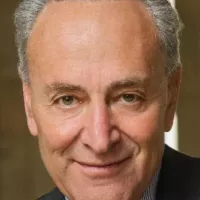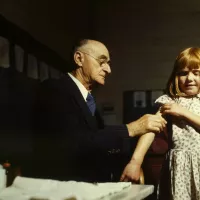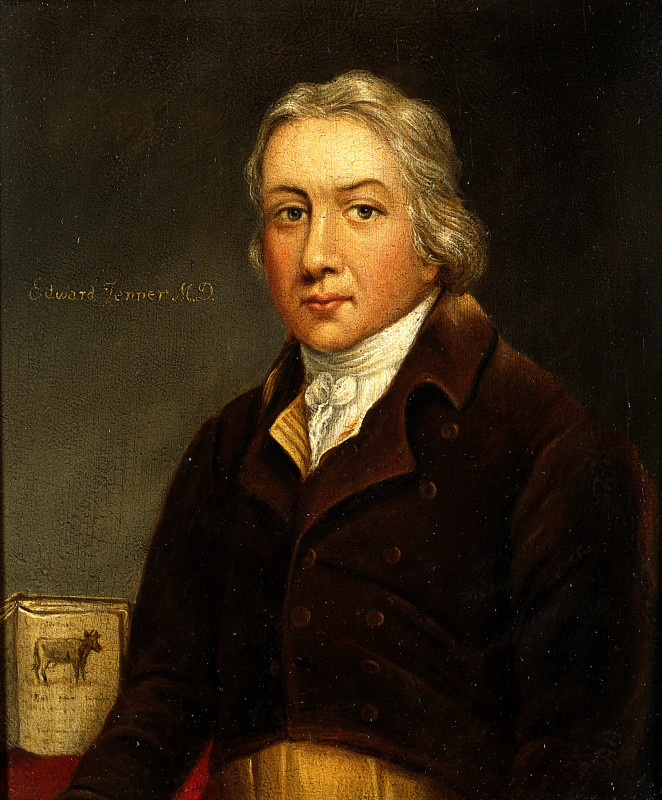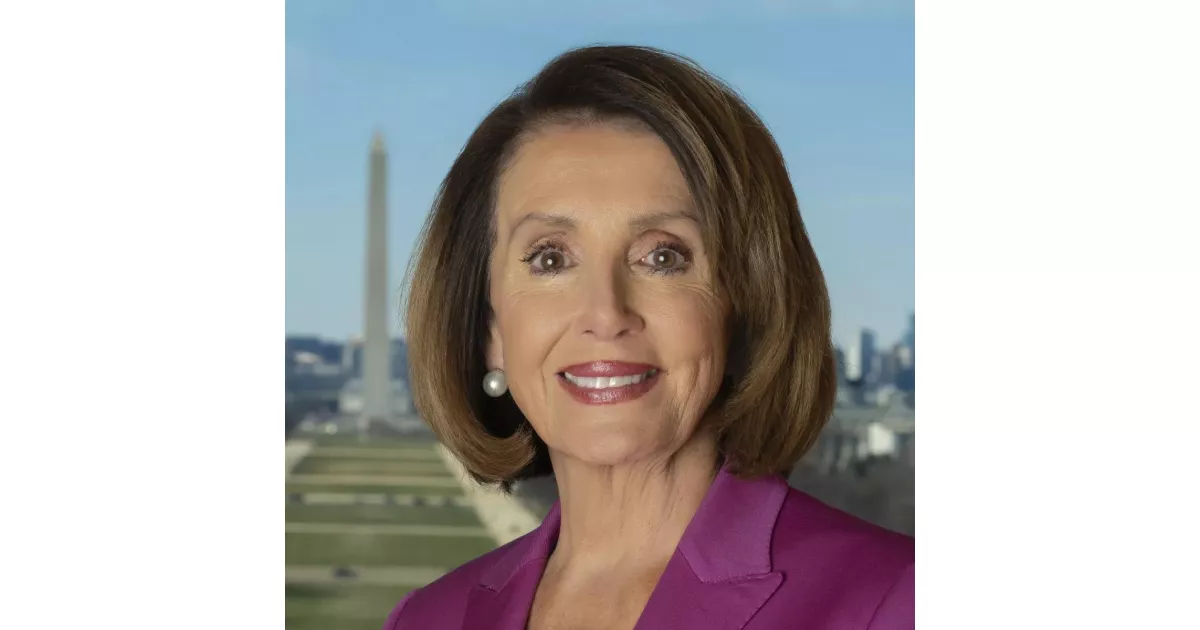Life is full of challenges, and Nancy Pelosi faced many. Discover key struggles and how they were overcome.
Nancy Pelosi is a prominent American politician, notably serving as the 52nd Speaker of the House of Representatives twice (2007-2011 and 2019-2023). As a Democrat representing California's 11th district since 1987, she made history as the first female Speaker and the first woman to lead a major party in Congress, heading House Democrats for two decades. Her long tenure as a House leader is second only to Sam Rayburn. She remains a significant figure in American politics and the dean of California's congressional delegation.
2002: Pelosi Opposes Iraq Resolution
In 2002, Nancy Pelosi opposed the Iraq Resolution authorizing President George W. Bush to use military force against Iraq.
2004: Pelosi opposed Bush's Social Security reform plan
In 2004, after President Bush proposed reforming Social Security, Nancy Pelosi, as minority leader, strongly opposed the plan. She imposed party discipline, leading to near-unanimous opposition within her caucus, and the proposal was defeated.
November 2005: Murtha Proposes Troop Withdrawal from Iraq
In November 2005, Democrat John Murtha proposed a U.S. troop withdrawal from Iraq, and Nancy Pelosi eventually endorsed the proposal after initially declining to commit to supporting it.
2006: Republican Advertisements Assail Pelosi
Leading up to the 2006 elections, Republicans began running advertisements attacking Nancy Pelosi to taint public perception of her.
2007: Pelosi held firm against impeachment
After becoming speaker in 2007, Nancy Pelosi held firm against impeaching President Bush, despite strong support for it among her constituents.
2008: Pelosi withstood a challenge for her seat
In the 2008 election, Nancy Pelosi withstood a challenge for her seat by antiwar activist Cindy Sheehan, who ran as an independent because of Pelosi's refusal to pursue impeachment.
November 2010: Politico Writer Called Pelosi's Record "Mixed"
In November 2010, after Democrats lost their House majority, a Politico writer called Nancy Pelosi's record as speaker "mixed". While acknowledging her power, the writer noted her poor approval rating and the negative impact of her legislative agenda, such as the Patient Protection and Affordable Care Act, on the party's electoral losses.
November 17, 2010: Pelosi Sought to Continue Leading House Democratic Caucus
On November 17, 2010, after the Democrats lost control of the House, Nancy Pelosi sought to continue leading the House Democratic Caucus as minority leader. She defeated Heath Shuler in the caucus vote.
2010: Republican Ads Against Pelosi in 2010 Cycle
During the 2010 election cycle, Republicans spent more than $65 million on ads that negatively characterized or invoked Nancy Pelosi.
2010: Republicans demonized Pelosi in advertisements
Leading up to the 2010 House elections, the Republican National Committee used a "Fire Pelosi" slogan and spent $65 million on anti-Pelosi advertisements. This was seen as a factor in her unpopularity.
August 2016: Pelosi's Contact Information Posted Online After Cyberattack
In August 2016, Nancy Pelosi said her personal contact information was posted online following a cyberattack against top Democratic campaign committees, and she received "obscene and sick calls, voice mails and text messages". She warned members of Congress to avoid letting children or family members answer calls or read texts.
November 17, 2016: Tim Ryan Bid to Replace Pelosi as House Minority Leader
On November 17, 2016, Tim Ryan of Ohio initiated a bid to replace Nancy Pelosi as House minority leader after being prompted by colleagues after the 2016 presidential election.
June 9, 2017: Pelosi criticizes Trump's tweets and fitness for office
During a news conference on June 9, 2017, Pelosi responded to a reporter's question about President Donald Trump's tweets regarding former FBI director James Comey, stating that no one at the White House seemed courageous enough to tell Trump that his tweets were beneath the dignity of the presidency and that she was worried about his fitness for office.
June 2017: Pelosi's Leadership Questioned After Special Election Losses
In June 2017, after Democrats lost four consecutive special elections in the House of Representatives, Nancy Pelosi's leadership was again called into question, with some House Democrats discussing potential new leadership and others publicly calling for it. Pelosi defended her leadership, emphasizing her legislative skills and political acumen.
January 2018: Pelosi criticizes Trump's State of the Union Address and refusal to implement Russian sanctions
In January 2018, Pelosi criticized Trump's State of the Union Address as a performance lacking serious policy ideas for collaboration and questioned his refusal to implement Russian sanctions.
February 2018: Pelosi criticizes Nunes and defends FBI
In February 2018, Nancy Pelosi sent a letter to Speaker Paul Ryan regarding the proposed release of a memo attacking the FBI's investigation into Russian interference in the 2016 United States elections. Pelosi warned that the memo was inaccurate and could threaten national security. She accused Republicans of a "cover-up campaign" to protect Trump and called for Devin Nunes' removal due to "deliberately dishonest actions".
February 2018: Pelosi Breaks House Speech Record
In February 2018, Pelosi broke the record for the longest House speech, speaking for over eight hours to recount stories from DREAMers. She was objecting to a budget deal that would raise spending caps without addressing the future of DACA recipients, who were at risk of deportation by the Trump administration.
February 2018: Pelosi criticizes Republicans' "cowering" to gun lobby
In February 2018, following the Stoneman Douglas High School shooting, Pelosi criticized Republicans for "cowering" to the gun lobby, calling it "an assault on our whole country". She urged House Speaker Ryan and Republicans to take action by considering legislation to expand background checks or allow researchers to use federal funds to study gun violence and public health. She also advocated for a special committee on gun violence.
March 2018: Pelosi Urges Trump to Focus on China
In March 2018, before the Trump administration took concrete measures against China, Nancy Pelosi and other Democratic leaders urged President Trump to focus more on China. Pelosi pressed Trump to impose punishments, such as naming China a currency manipulator, stopping China from pressuring U.S. tech companies into giving up intellectual property rights, and taking a strong stand against unfair market barriers in China.
May 2018: Pelosi and Schumer request bipartisan briefing
In May 2018, after the White House invited only Republicans to a Department of Justice briefing on an FBI informant related to the Trump campaign, Pelosi and Schumer sent a letter to Rod Rosenstein and Christopher Wray requesting a bipartisan Gang of Eight briefing involving congressional leadership from both chambers.
June 2018: Pelosi calls for Nielsen's resignation
In June 2018, Pelosi visited a federal facility detaining migrant children separated from their parents and subsequently called for the resignation of Department of Homeland Security Secretary Kirstjen Nielsen.
August 2018: Pelosi calls for Hunter's resignation
In August 2018, Nancy Pelosi called for Duncan D. Hunter's resignation following his indictment on charges of misusing at least $250,000 in campaign funds. She stated the charges were "evidence of the rampant culture of corruption among Republicans in Washington today".
January 25, 2019: Trump signs bill to reopen government
On January 25, 2019, Trump signed a stopgap bill to reopen the government for three weeks without border wall funding. This came after Pelosi opposed Trump's attempts to use the 2018-2019 shutdown to build a wall on the U.S.-Mexico border.
April 2019: Trump vows to defy House subpoenas
In April 2019, President Trump vowed to defy "all" subpoenas from the House and to refuse to allow current or former administration officials to testify before House committees.
May 2019: Pelosi accuses Trump of obstruction of justice and cover-up
In May 2019, after the White House intervened to halt Don McGahn's compliance with a House subpoena, Pelosi accused Trump of obstructing justice and engaging in a cover-up, stating that "Trump is goading us to impeach him."
June 5, 2019: Pelosi says she wants to see Trump in prison
On June 5, 2019, during a meeting with senior Democrats, Pelosi stated, "I don't want to see him impeached, I want to see him in prison," indicating a preference for Trump to lose the 2020 election and then be prosecuted.
September 2019: Pelosi announces formal House impeachment inquiry of Trump
In September 2019, following revelations of the Trump–Ukraine scandal, Pelosi announced the beginning of a formal House impeachment inquiry, stating that Trump's actions "seriously violated the Constitution".
September 29, 2019: Pelosi announces impeachment inquiry against Trump
On September 29, 2019, Nancy Pelosi announced the launch of an impeachment inquiry against President Trump.
December 5, 2019: Pelosi authorizes drafting of impeachment articles
On December 5, 2019, Pelosi authorized the Judiciary Committee to begin drafting articles of impeachment against Trump, following the impeachment inquiry.
December 2019: First Impeachment of President Trump
In December 2019, the House impeached President Donald Trump for the first time during Nancy Pelosi's second speakership.
December 18, 2019: House votes to impeach Trump
On December 18, 2019, the House voted to impeach Trump for abuse of power and obstruction of Congress, making him the third president in U.S. history to be impeached. Pelosi called it tragic but necessary due to Trump's reckless actions.
January 15, 2020: House transmits articles of impeachment to the Senate
On January 15, 2020, the House transmitted the articles of impeachment to the Senate, with Pelosi naming seven Democratic Representatives as House managers to argue the impeachment case against Trump.
February 4, 2020: Pelosi tears up Trump's State of the Union address
On February 4, 2020, at the conclusion of Trump's State of the Union address, Pelosi tore up her official copy of it, stating it was "a courteous thing to do considering the alternatives. It was a such a dirty speech". Trump and other Republicans criticized her for this action.
September 2020: Pelosi visits hair salon
In early September 2020, Nancy Pelosi visited a hair salon in San Francisco, which was against regulations enforced at that time preventing indoor services. She was criticized for hypocrisy, and Pelosi described the situation as "clearly a setup".
October 8, 2020: Pelosi announces legislation for commission on 25th Amendment use
On October 8, 2020, Pelosi announced that legislation was being introduced in the House of Representatives to advance the creation of a commission to allow the use of the 25th Amendment to the Constitution to intervene and remove Trump from executive duties.
January 2021: Pelosi's San Francisco Home Vandalized
In January 2021, Pelosi's San Francisco home was vandalized with graffiti, messages of "[c]ancel rent", fake blood, and a severed pig's head.
January 2021: Second Impeachment of President Trump
In January 2021, the House impeached President Donald Trump for the second time during Nancy Pelosi's second speakership.
April 2021: Republicans criticize Pelosi over border comments
In April 2021, after southern border crossings peaked, House Republicans criticized Pelosi for saying that immigration under the Biden administration was "on a good path".
August 5, 2022: China Sanctions Pelosi
On August 5, 2022, the Chinese government sanctioned Nancy Pelosi for "seriously interfering in China's internal affairs, undermining China's sovereignty and territorial integrity, trampling on the one-China policy, and threatening the peace and stability of the Taiwan Strait".
October 2022: Paul Pelosi Attacked at Home
In October 2022, while Pelosi was in Washington, D.C., an intruder entered her San Francisco home demanding to know her whereabouts, and attacked her husband, Paul Pelosi, with a hammer. The assailant, David DePape, was convicted on federal and state charges and sentenced to life without parole.
2022: Republican Ads Against Pelosi in 2022 Election
During the 2022 election cycle, Republicans ran more than $50 million in ads that negatively characterized or invoked Nancy Pelosi.
2022: Pelosi Reelected, Democrats Lose House Majority
In 2022, Pelosi was reelected to the House, but the Democratic Party lost the House majority. Ten days later, she announced she would not seek a Democratic leadership post in the next Congress.
2022: Republicans Retake the House
In 2022, the Republicans narrowly retook control of the House, ending Nancy Pelosi's tenure as speaker.
December 2024: Pelosi Hospitalized After Hip Fracture
In December 2024, Pelosi was hospitalized after fracturing her hip while falling down stairs in high heels during an official trip to Luxembourg, where she was part of a bipartisan delegation to observe the 80th anniversary of the Battle of the Bulge. On December 14, she underwent hip replacement surgery at Landstuhl Regional Medical Center, a U.S. military hospital in Germany.
2024: Pelosi urges Biden to withdraw candidacy
Amid concerns about President Biden's reelection prospects in the 2024 presidential election, Pelosi and other Democratic officials urged him to withdraw his candidacy before the party's National Convention. On July 10, Pelosi said the party encouraged Biden to make the decision because time was running out. He withdrew from the race on July 21 and endorsed Vice President Kamala Harris as the party's presidential nominee.
Mentioned in this timeline

Vladimir Vladimirovich Putin is a Russian politician and former intelligence...

Chuck Schumer is the senior United States Senator from New...

Pope Francis served as the head of the Catholic Church...

Barack Obama the th U S President - was the...
Ukraine is a country in Eastern Europe the second-largest on...

Hillary Diane Rodham Clinton is a prominent American politician lawyer...
Trending

51 minutes ago Google Maps to fully function in South Korea after data agreement.

2 hours ago CDC Panel to Discuss COVID-19 Vaccine Injuries Following RFK Jr.'s Meeting

51 minutes ago CDC Panel to Discuss COVID Vaccine Injuries Following RFK Jr.'s Meeting

2 hours ago Casey Means' Surgeon General Nomination Faces Scrutiny Over Mainstream Medicine Criticism and Birth Control Views.
3 hours ago Punch, the lonely baby monkey, goes viral and wins hearts worldwide.

4 hours ago Jon Hamm Discovers Viral Dancing Meme; Reacts to Meme-Worthy Status at 54.
Popular

Jesse Jackson is an American civil rights activist politician and...

Barack Obama the th U S President - was the...

Susan Rice is an American diplomat and public official prominent...

XXXTentacion born Jahseh Dwayne Ricardo Onfroy was a controversial yet...

Michael Joseph Jackson the King of Pop was a highly...

Kashyap Pramod Patel is an American lawyer who became the...
